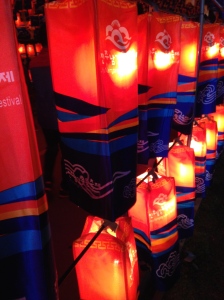

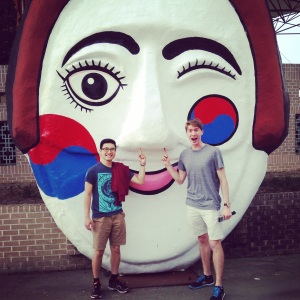

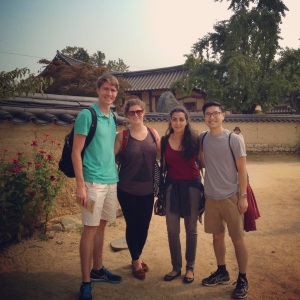

Why did you choose to teach in Korea?
I was attracted to Korea because of the great benefits afforded to English teachers, the rich culture, interesting food, and (relatively) easy-to-learn language. The country is also 70% mountainous, so the landscape is beautiful and hiking is very popular. Additionally, Korea is just a short plane ride away from other exotic destinations in Asia like Thailand, Cambodia, the Philippines and more!
Did you come to Korea having taught before?
Heck no! But it certainly would’ve helped. I did get a TEFL Certificate online through International TEFL Academy, as it’s one of the applicaiton prerequisites. Getting certified gave me more confidence with lesson planning and helped me anticipate the challenges ahead of me. It does make the job more difficult, but it’s totally possible to come here with no teaching experience.
What levels are you teaching and where?
I’m teaching middle and high school English in Ulsan, South Korea, located in the southeast corner of the country. I work in a public school but there’s a whole different world of private school teaching possibilities.
Is there life outside of Seoul?
Absolutely! Many people have their hearts so set on living in Seoul or Busan, the country’s two biggest cities. And yes, they offer the widest and most diverse array of activities and social opportunities. But there’s so much more to Korea, and the country has loads of other cities with 1 million+ people. Also, think of it this way, Seoul and Busan are more international/cosmopolitan cities. So if you get placed in a city that’s not one of those two, you could argue you’ll be getting a more authentic Korean experience.
What’s the difference between public and private school jobs?
The positions pay about the same (private school teachers sometimes make $100-$300 more a month) but the hours are different (9-5 for public vs 2-10 for private). Also, most public school jobs these days are with elementary age kids. Private schools offer more of a mix. It was randomly decided that I was placed with older students. Also, private school teachers spend their whole school day teaching, so their total teaching hours are close to 40 each week. Public school teachers on average teach around 20 or 22 hours/week (22 is the limit).
What’re the application processes like? How long does it take to get a job?
If you’re looking to do something in the immediate future, private academies or “hagwons” might be your best option. The public school application process is very lengthy with a lot of hoops to jump through, usually starting in early February for a fall start date, and August for a late winter start date. As for private academies, it’s easy to find and accept private school jobs in 2 months or less. To see what sort of opportunities are out there currently, visit Dave’s ESL Cafe.
What are the minimum requirements to teach with EPIK?
The only requirements are that you have a bachelors degree (doesn’t have to be in English, though that does help) and either an official teaching license OR a TEFL certification (Teaching English as a Foreign Language). Other certificates like TESOL are the same thing. I got my TEFL certificate through International TEFL Academy’s online program. It was 10 weeks long and cost $1000.
How long is your contract for?
My contract is for 1 year, which is standard across all teaching gigs here.
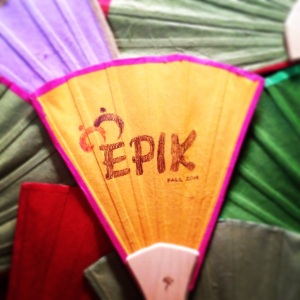

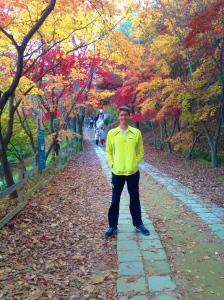


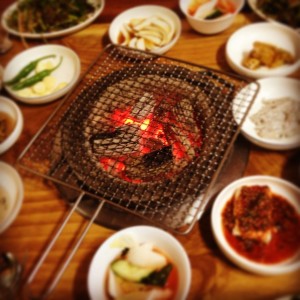
What benefits will I receive?
EPIK offers public school teachers paid airfare to and from Korea, paid housing, 50% of your healthcare coverage (the other 50% is automatically deducted from your paycheck), a severance bonus equivalent to one months pay upon completion of contract, a competitive salary (about $2000/month), and good vacation time (18 paid days off plus national holidays).
Private schools also pay for airfare and housing, 50% healthcare and a severance bonus (probably, I don’t know for sure about the last two).
How much money can I save while teaching in Korea?
The cost of living and my monthly bills here are so low too that I can save between $1000-$1500 every month for travel or future savings, so that’s great. I eat out once or twice a week, and enjoy a drink or two with friends on Friday nights. My most expensive bill is for my iPhone, which comes to around $100 / month. My gas heating bill hit its high at $70 / month in January and February. But since spring is on the rise now, that is sure to go down to virtually $0. Cable, internet and electric bills vary according to your building. In my case, I only pay electric and gas.
How would you rate your experience overall?
So far, in general, I’d give it an 8/10! There are a lot of things that I like about Korea and living abroad. I’ve gotten to travel a ridiculous amount. I make really great money and enjoy awesome benefits (benefits that most other countries don’t give English teachers). I have a great network/group of expat friends. My school treats me very well and it’s been a very interesting cultural experience. However, I miss my family and friends like crazy. I miss home almost every day. There are days when the language barrier, the weird food, other social norms and the stresses of being a new teacher feel like way too much.
The people are very friendly(!) but don’t speak much English. The food is good, but often very fish-based. And the language, while still difficult, is easier to learn than any of the other Asian languages (the Korean alphabet is phonetic so theoretically you can learn to read in a day, you just won’t know what you’re saying haha). Overall the good has outweighed the bad, but I think come August 2015 I’ll be happy to head back to the States.
So, it’s worth it?
Definitely! Teaching English is a fun and exciting way to see the world and gain some international work experience. During my first six months abroad I’ve been all over Korea, as well as taken trips to Cambodia and Thailand. Especially since I didn’t come from a teaching background, it has been full of challenges and I’ve just had to do the best I can. Still, I’m glad I’m here and I wouldn’t change anything about my decisions or experiences.
If you have other questions for me about teaching, living or traveling in Korea, please leave them in the comments section and I promise to answer them!
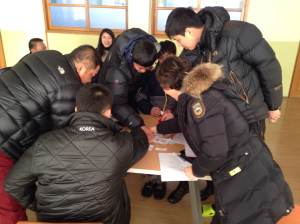
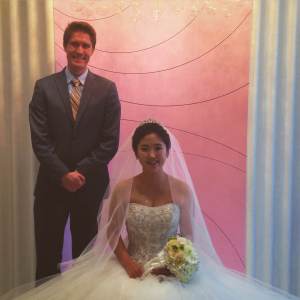
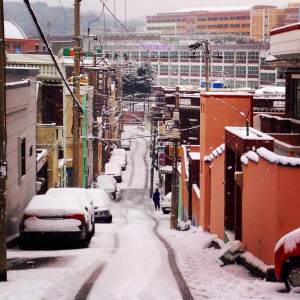
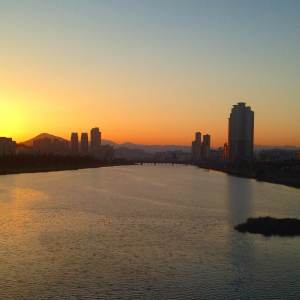


To view the original post and other great content, visit Korealizations at:
http://korealizations.wordpress.com
Like Korealizations on Facebook and subscribe on YouTube! Thanks for reading!


Recent comments